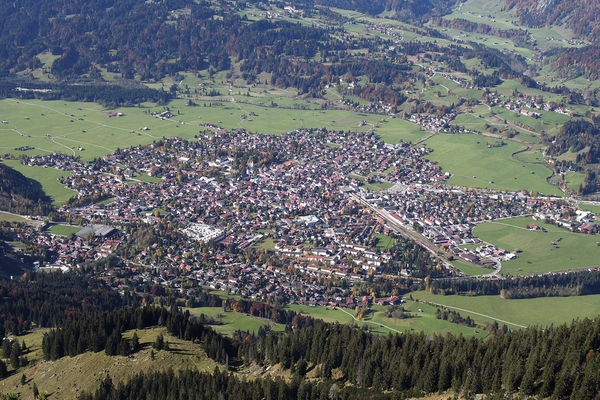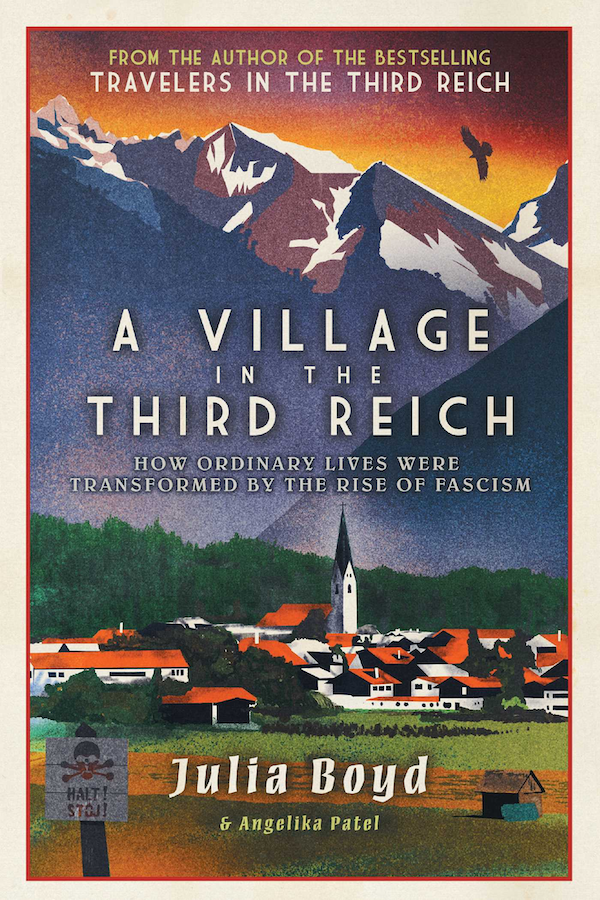A Small Village's History During the Third Reich Raises Big Questions about Complicity

The village of Oberstdorf, Bavaria
At first sight it would seem unlikely that the Bavarian village of Oberstdorf has much to tell us about the Third Reich. Perched on the border with Austria, it is the most southern village in Germany, located 100 miles southwest of the nearest city, Munich. Yet, such was the grip of National Socialism on German society that even in this remote place there was scarcely any aspect of Nazi rule or of the Second World War that did not touch its 4000-odd inhabitants one way or another. Their accounts, in turn shocking, revealing and moving, lead us to ask that all-important question – “what would I have done?”
Like so many of their fellow citizens, Oberstdorfers—deeply Catholic and conservative by nature —were drawn to Hitler by his promise to implement strong government, to expunge the ignominy of the Treaty of Versailles, to defeat Communism, and to put Germany back where it belonged at the top table of nations. Only a couple of months after the Armistice, Quakers from England and America were already in Germany preaching their message of hope and reconciliation. Their reports on the countless conversations they held with ordinary Germans make it clear that even though people were cold and starving, even though they were stricken with grief and fearful of the violence erupting in so many cities, it was the humiliation of having their country treated like a pariah that pained them most. Humiliation as a driver of conflict has arguably been underestimated. Certainly, Putin’s fury at what he saw as the disgrace of the dissolution of the Soviet empire is often cited as a cause of his invasion of Ukraine.
Although a majority of villagers voted for Hitler in the March 1933 election, they were quite unprepared for the draconian measures imposed on them by their first Nazi mayor, an outsider who treated their traditions and institutions with open contempt. Indeed, Oberstdorf was not the only rural community that, while enthusiastically supporting Hitler, clashed with local Nazi officials. Nor, indeed, did the villagers have much time for the storm troopers (SA) whose aggression and noisy parades were so damaging to the tourist economy on which this once poor rural community now largely depended.
In common with many other small towns and villages, Oberstdorf’s residents exhibited a wide range of attitudes toward the regime. Unquestionably there were plenty of Nazis in the village, many of whom were to remain dedicated to Hitler to the bitter end and beyond. But there were others who, having started out as committed party-members, changed their minds as it became ever harder to ignore the true nature of the Third Reich.
Ludwig Fink, Oberstdorf’s second Nazi mayor, is a prime example. Initially seduced by Hitler’s determination to restore Germany’s prestige and prosperity, he, like so many others, assumed that once securely in power the Nazis’ more extreme policies and rhetoric would subside. When, on the contrary, they only worsened, we might ask why Fink did not protest or resign. The truth is that any such act of defiance would have condemned him to a concentration camp or the guillotine. And even had he been courageous enough to accept that fate, what would have become of his family? His wife and two sons (one of whom was epileptic) would have been left destitute. Fink’s response to his loss of faith in National Socialism, therefore, was to mitigate as much as possible the worst effects of Nazi rule in the village. He tried to protect the handful of Jews living there, and helped the local nuns when they were targeted by the regime. He defended villagers threatened with imprisonment for infringing any one of the Nazis’ countless petty rules and regulations, and in the last months of the war refused to carry out orders to execute villagers attempting to surrender.
The burning question is how much did Fink and his villagers know about Nazi atrocities—the concentration camps, the Holocaust, the torture and murder of homosexuals, Roma (known as Gypsies), the disabled and anyone else the Nazis didn’t like? In my view they knew a great deal. A teenager from the village was gassed in Hitler’s so-called “euthanasia” program because he was blind. Soldiers who had witnessed or had themselves perpetrated barbaric deeds were continually returning home on leave. At least some of them must have unburdened themselves to their families and friends. One man, Heinz Schubert, who claimed descent from the composer’s family, was responsible for organizing the murder of 700 Roma in the Crimea. What did he tell his wife and friends when he was back in Oberstdorf? Later at his Nuremberg trial, he stated, “we thought we were saving Western civilization.”
Then there were the assorted camps that existed close to the village—a Waffen-SS training camp, Dachau subcamps and several forced labor camps. Every day the villagers saw foreign slave workers being marched to and fro and can hardly have been unaware of the appalling conditions in which they lived. At Sonthofen, just 10 miles north of Oberstdorf, there stood a Nazi castle often visited by party bigwigs including Himmler, who went there specifically to brief local Nazis on the Final Solution.
Towards the end of the war, when Messerschmitt and BMW moved their operations out of Augsburg and Munich to escape the bombing, several manufactories were established in and around Oberstdorf. Furthermore, as the war progressed, Oberstdorf’s population doubled, first with evacuees from the bombing and then with refugees fleeing the Russians. All had terrible tales to tell.
While villagers loyal to Hitler blamed reports of atrocities on enemy propaganda, those who had detested the regime from the start needed little convincing they were true. Most Oberstdorfers, however, once they realized how catastrophically they had been duped, just wanted to keep their heads down and somehow stay alive until it was all over.
Immediately after the war when Oberstdorfers—like Germans everywhere—came close to starvation, they were too absorbed in trying to rebuild their lives to spend much time contemplating their own or Germany’s culpability. Their one overriding desire was to extinguish all memories of Hitler and National Socialism. Since then, Germany has been impeccable in examining its Nazi past, but there will always be more questions. In recent times the focus has shifted from the leading figures of the Third Reich to ordinary Germans, the dilemmas they faced, and the moral decisions they made in what can only be described as the most far-reaching tragedy and crime in human history.
